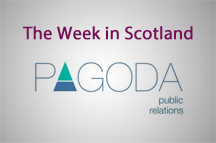The big story in Scotland this week was the visit of the Bank of England Governor, Mark Carney, and his views of Scotland and the rest of the UK entering into a currency union after a Yes vote in the referendum.
Mr Carney struck a politician’s tone as he explained to an audience of Scottish business people that such a currency union was technically viable, but would require a strong framework of rules, noting the failures of the Eurozone were in part caused by its laissez faire fiscal policy.
And as expected both sides sought to use the Governor’s speech as an endorsement of their own side’s view. For Yes Scotland the Governor’s speech proved their plans for a currency union can be made to work - while Alistair Darling responded by saying the governor's remarks “quietly demolishes Alex Salmond’s claim that Scotland could keep the UK pound after leaving the UK.”
While the former Chancellor understandably ignored how politics would bend to meet economic reality in the event of a yes vote; the truth is that Scotland would have to give up some sovereignty over banking and fiscal rules - and agree that the UK government could approve overall levels of spending for a union to be effective, at least in the short term. While other options are available such as separate Scottish currency or unilaterally pegging the Scottish pound to the English pound, for the SNP to suggest these as possible options woudl send a message that they don't have a clear plan for what currency independent Scotland would use.
Setting aside the euro, stable and successful currency unions between asymmetrical nations have been common practice across the world (pre-1999 Belgium and Luxembourg or Liechiesten and Switzerland today) and there is no practical reason that such a union between Scotland, even with spending limitations imposed by London, could not be very effective. Indeed the Governor’s comments that any such union would require the free movement of labour, capital and goods across borders would have been welcomed by the SNP as one of the strengths of any currency union. However, in politics if you are explaining you

are losing and given the lengths the SNP machine went to communicate why giving up fiscal control to London is a good thing it is clear they are worried about the impact this issue could have.
The Governor’s intervention has restarted the currency debate, and in turn put the SNP on the defensive, with difficult questions being asked about what independence actually looks like and if it would be worth the upheaval. What we don’t yet know is if this will stop the Yes campaign’s recent momentum in its tracks.
Callum Chomczuk
Account Director – Pagoda PR












